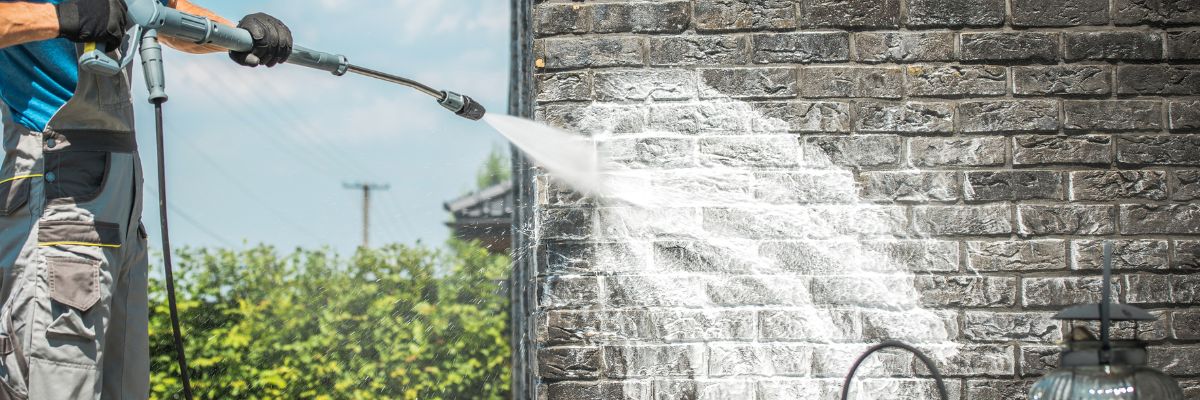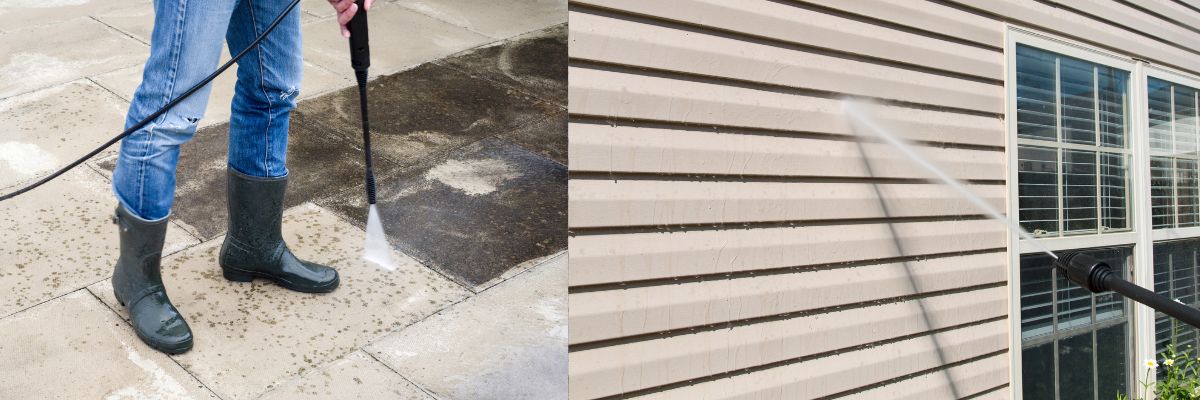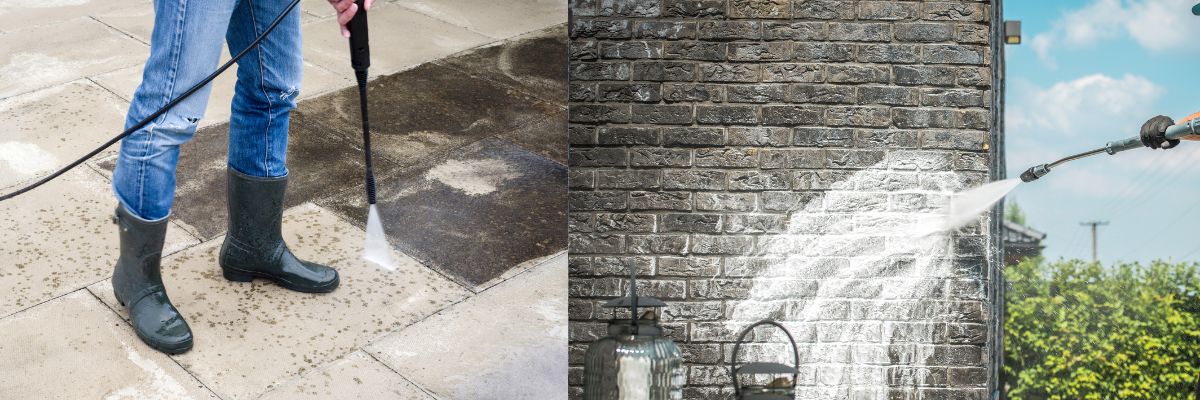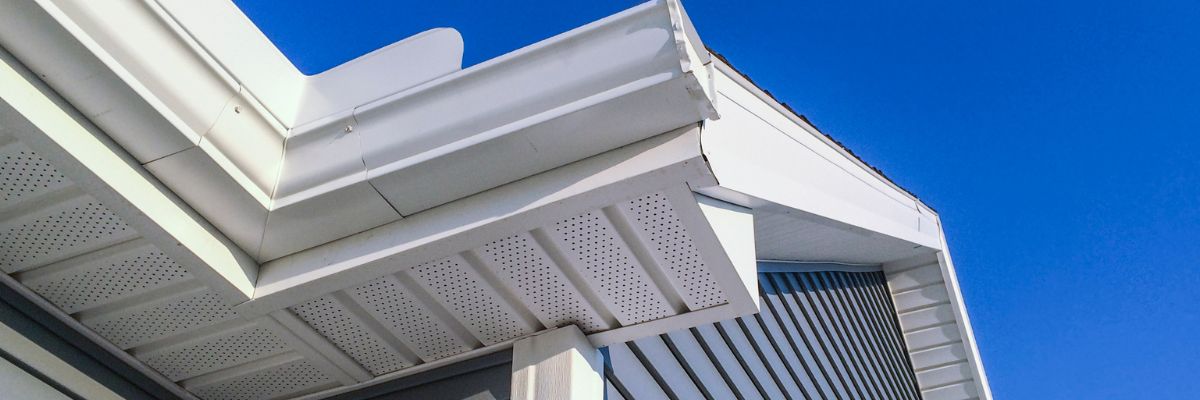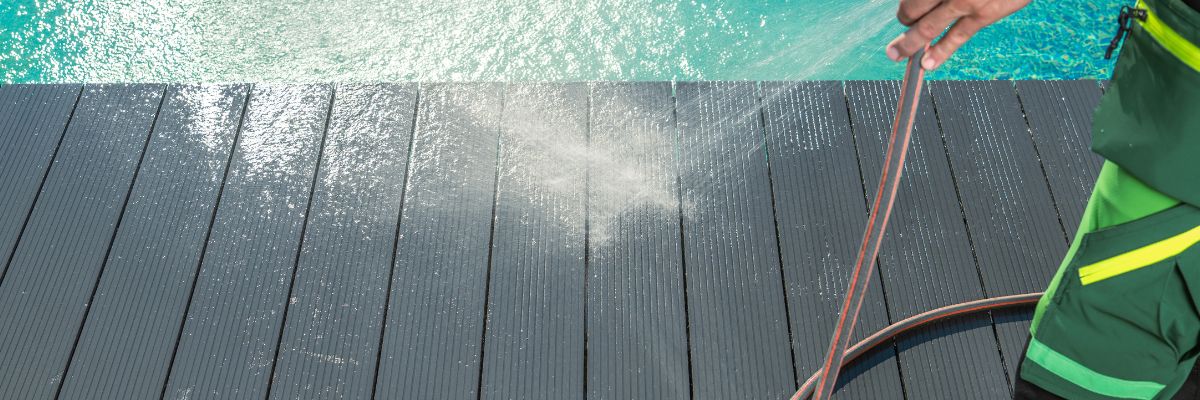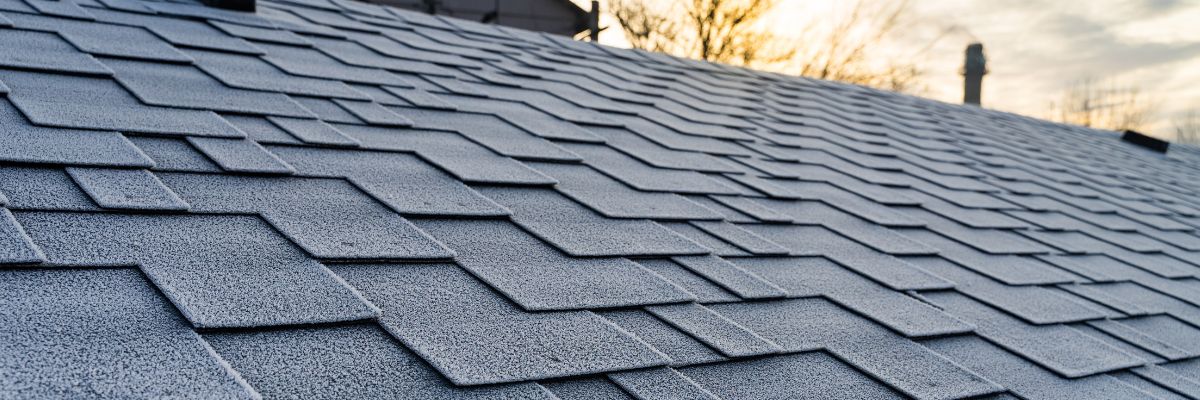Not all tile roofs react the same way to pressure washing. Some tiles are more fragile than others, making them highly susceptible to cracking, chipping, or erosion. Below is a breakdown of different tile types and their compatibility with pressure washing.
| Material | No | Use with Caution |
| Clay Tiles | ✔ | |
| Concrete Tiles | ✔ (Use low pressure, <1,200 PSI) | |
| Slate Tiles | ✔ | |
| Ceramic Tiles | ✔ |

What Tile Materials Can Be Pressure Washed?
Concrete Tiles
Concrete tiles are one of the most durable types of tile roofing, and they can withstand pressure washing if done carefully. However, excessive pressure can cause surface erosion, cracks, or water intrusion under the tiles.
To safely pressure wash concrete tiles, it is recommended to use a pressure setting below 1,200 PSI and a wide spray nozzle to distribute the force evenly. Walking on concrete tiles should be minimized, as they can break under weight. Additionally, if the tiles have a protective sealant, high pressure could strip it away, requiring reapplication.
When pressure washing concrete tiles, it is essential to work at a downward angle to prevent water from being forced under the tiles, which can lead to leaks and structural damage.
Synthetic (Composite) Tiles
Synthetic or composite tiles, made from a blend of rubber, plastic, or other materials, are designed to be more durable than traditional tile roofing. These tiles can generally withstand pressure washing at a low to medium setting, typically up to 1,500 PSI, but it is important to check the manufacturer’s recommendations.
Synthetic tiles are less prone to cracking compared to clay or slate, but improper pressure washing techniques can still cause damage, especially if high pressure is concentrated in one spot.
Using a wide spray pattern and maintaining a safe distance from the roof surface will help minimize the risk of stripping away any protective coatings or causing premature wear. Before pressure washing a synthetic tile roof, it is advisable to test a small section to ensure that the material is not affected by the water pressure.
What Tile Materials Cannot Be Pressure Washed?
Clay Tiles
Clay tiles should not be pressure washed due to their porous and fragile nature. The high force of a pressure washer can crack or erode the tiles, weakening their structural integrity over time. Additionally, clay tiles often have a protective glaze that can be stripped away by high-pressure water, leaving them vulnerable to further weathering and damage. Because of their fragility, even walking on a clay tile roof can result in breakage, making it crucial to use alternative cleaning methods. Instead of pressure washing, a soft washing approach with a low-pressure rinse and a specialized cleaning solution is a much safer and more effective way to remove dirt, algae, and moss from clay tiles without causing damage.
Slate Tiles
Slate tiles are another type of roofing material that should never be pressure washed. Although slate is a naturally durable material, it is also brittle and can easily chip, crack, or split when subjected to high-pressure water. Pressure washing a slate roof can cause irreversible damage, leading to expensive repairs or even the need for a full roof replacement. Additionally, the water force can loosen the nails or adhesives holding the tiles in place, creating gaps that allow moisture to seep underneath. Instead of pressure washing, a combination of soft washing and manual cleaning using a soft-bristled brush and mild detergent is a safer method for maintaining the appearance and longevity of a slate tile roof.
Ceramic Tiles
Ceramic tiles, which often feature a protective glaze, should not be pressure washed because the force of the water can strip away the glazed surface. Once the glaze is removed, the tile becomes more vulnerable to weather damage and wear. Additionally, high-pressure washing can lead to cracks and breakage, compromising the integrity of the roof. Because ceramic tiles are often delicate, even applying moderate pressure can cause structural damage. Soft washing with a gentle cleaning solution is a far safer alternative for cleaning ceramic tile roofs, as it removes dirt and organic growth without damaging the protective coating.
Risks of Pressure Washing Tile Roofs
Although pressure washing may remove surface debris and stains quickly, it comes with significant risks that can lead to long-term damage to the roof. Below are some of the primary concerns:
Warranty Voidance
Many tile manufacturers explicitly prohibit pressure washing in their maintenance guidelines. Using high-pressure water on a tile roof may void the manufacturer’s warranty, leaving homeowners responsible for any damages or repairs.
Tile Damage
The high intensity of water pressure can cause tiles to crack, loosen, or dislodge from the roof. Cracked or broken tiles can compromise the roof’s ability to protect against weather elements and lead to leaks and interior damage.
Water Intrusion
Excessive pressure can force water under the tiles, leading to moisture buildup in the underlayment. This can result in mold growth, structural damage, and weakened roofing components, ultimately shortening the roof’s lifespan.
How to Safely Pressure Wash a Tile Roof (If Absolutely Necessary)
If pressure washing is the only available option for cleaning a tile roof, following these best practices can minimize the risk of damage.
Use Low Pressure
Set the pressure washer to less than 1,200 PSI to prevent excessive force on the tiles. A lower pressure setting will help avoid cracks and displacement of tiles.
Use a Wide Spray Nozzle
A wide fan tip nozzle should be used to distribute water evenly and prevent concentrated streams that can damage the tiles. This also helps avoid erosion of protective coatings on the tile surface.
Avoid Walking on Tiles
Walking on tile roofs can cause breakage or dislodging of tiles, especially if they are old or brittle. If accessing the roof is necessary, stepping on the peaks of the tiles (instead of the valleys) can help minimize damage. However, it is always recommended to hire a professional who understands the safest way to navigate a tile roof.
Avoid Harsh Chemicals
Strong chemicals can degrade the tile material and strip away protective coatings. Instead of harsh chemicals, use a gentle, tile-safe detergent or a mixture of water and biodegradable soap for cleaning.
Consider Professional Help
Cleaning a tile roof requires experience and the right techniques to avoid damage. Hiring a professional roof cleaner ensures that the job is done safely and effectively without the risks associated with DIY pressure washing.
Alternatives to Pressure Washing a Tile Roof
To prevent potential damage, homeowners should consider safer alternatives to pressure washing. These methods can clean tile roofs effectively while preserving their structure and appearance.
Soft Washing
Soft washing is one of the best alternatives to pressure washing for tile roofs. This method uses a combination of low-pressure water and specialized cleaning solutions to break down algae, moss, and dirt without causing damage. Soft washing helps maintain the integrity of the tiles while providing a deep clean.
Spray-On Solutions
Several commercial spray-on roof cleaning solutions are designed specifically for tile roofs. These solutions are applied to the surface and left to break down dirt and organic growth over time. Once the solution has done its job, it can be rinsed away with a garden hose, requiring minimal pressure.
Manual Cleaning with a Soft Brush
For minor dirt buildup or spot cleaning, a soft-bristled brush and soapy water can be used to clean tile surfaces. This method is labor-intensive but prevents the risks associated with high-pressure washing.
Preventative Maintenance
To minimize the need for deep cleaning, homeowners should implement preventative maintenance measures such as:
- Regular gutter cleaning to prevent water from backing up onto the roof.
- Trimming overhanging trees to reduce debris accumulation and shade-induced moss growth.
- Applying an algaecide treatment to prevent future algae and moss buildup.
Final Thoughts
Unless your roof tiles are made of concrete, you should not pressure wash your tile roof. Doing so can damage your roof tiles and lead to expensive roof replacement.
For most homes, soft wash roof cleaning is the preferred method of pros. Soft wash uses low pressure and a cleaning solution to break away grime and mold.
Talk to Vesta Pro Wash today and get a free quote on your next tile roof cleaning!



